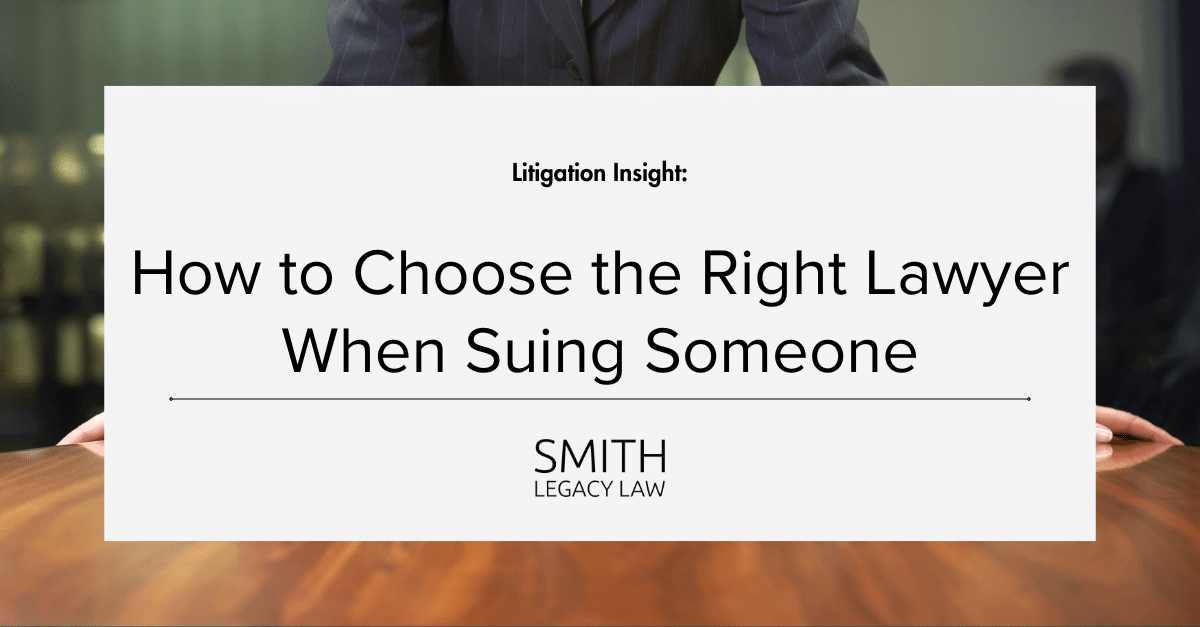If you are considering suing someone, one of the first steps is finding an attorney. While it may be fine to represent yourself in a small claims matter, it is usually best to get professional legal advice when seeking court intervention. Choosing the right lawyer when suing someone may be intimidating, especially if you don’t have a recommendation from a friend or other trusted person. However, even if you are referred to an attorney, you should consider the factors below before you hire anyone.
Does the Attorney Have the Experience Needed to Handle Your Lawsuit?
Before you search for an attorney, you must understand what type of case you have. Were you injured in an accident? Do you have a contract dispute? Are you contesting a will or trust? Many lawyers are “generalists,” meaning they say they handle all types of cases. However, in reality, they likely do a few things very well and are less adept in other areas. As a result, you should look closely at the attorney’s experience to determine to what extent he or she has dealt with cases similar to your own. You should go beyond a simple review of the website and do a google search to see whether they have written or spoken on relevant legal topics, are involved with professional or industry organizations, have received good reviews from past clients, and other indications that they have the knowledge and skills you need. In addition, take advantage of your free consultation to ask detailed questions about the attorney’s experience.
Is the Attorney Licensed to Practice Law in the State?
Depending on the type of case, your lawsuit may be brought in a different state than where you live, or the applicable law for your case could be that of another state. For example, if you are suing someone for breach of contract, the agreement may have a clause stating that all disputes must be brought in New York, but Delaware law applies to the action.
If you are unsure where the action should be filed, the attorney you consult can tell you, and then you can confirm whether he or she is licensed. If a different state’s law applies, the right lawyer should also have experience with that law or have attorneys in that state to consult as needed.
What Are the Attorney’s Legal Fees?
There is usually a wide range of fees that attorneys may charge. As will be discussed in a future post, there are different types of billing arrangements, including hourly billing, flat fees, hybrid fees (flat and hourly or hourly and contingency combined), and contingency fees. Typically, the more experience an attorney has in your type of matter, the higher the fee. For example, a “generalist” will probably charge less than someone who focuses their legal practice on commercial litigation. However, the generalist may also lack the necessary skills to handle your matter efficiently, meaning you end up paying more in fees, recovering less, or paying more in damages.
Many people like the idea of a contingency fee because they only pay their attorney if they win the case. However, there is an inherent incentive in all contingency fee cases for the lawyer to try to settle as quickly as possible, which may not be to your benefit. Contingency fees are also only available in a limited number of cases.
Regardless of what type of billing arrangement your attorney proposes, he or she should clearly explain fees to you at your initial consultation. After your first meeting with an attorney, there should be no mystery about the type of fee you will be charged.
Is the Attorney Responsive and Accessible?
You should feel comfortable talking to your attorney and dealing with others at the firm, including administrative and legal staff. During your initial consultation, make sure that you meet with the lawyer who will be handling your case. The attorney should be a good listener and an effective communicator who answers your questions and provides information in a clear and understandable manner. Staff should also be responsive, courteous, and attentive.
Do You Need an Attorney in Your Case?
Our attorneys are skilled litigators and legal advisors who have helped hundreds of clients resolve their legal problems. To learn whether we are the right lawyer for your case, contact us for a consultation.
